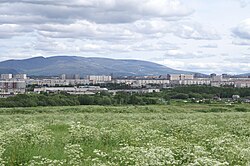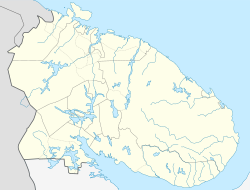Apatity
Apatity
Апатиты | |
|---|---|
 Apatity and Khibiny Mountains | |
| Coordinates: 67°34′N 33°24′E / 67.567°N 33.400°E | |
| Country | Russia |
| Federal subject | Murmansk Oblast[1] |
| Urban locality | 1935[2] |
| Town status since | July 7, 1966[3] |
| Government | |
| • Mayor | Konstantin Gumenichenko |
| Elevation | 170 m (560 ft) |
| Population | |
| • Total | 59,672 |
| • Estimate (2018)[5] | 55,713 (−6.6%) |
| • Rank | 276th in 2010 |
| • Subordinated to | Apatity Town with Jurisdictional Territory[1] |
| • Capital of | Apatity Town with Jurisdictional Territory[1] |
| • Urban okrug | Apatity Urban Okrug[6] |
| • Capital of | Apatity Urban Okrug[6] |
| Time zone | UTC+3 (MSK |
| Postal code(s)[8] | 184209 |
| Dialing code(s) | +7 81555 |
| OKTMO ID | 47705000001 |
| Website | apatity |
Apatity (Russian: Апатиты, IPA: [əpɐˈtʲitɨ], lit. apatites) is a town in Murmansk Oblast, Russia, located along the Murman Railway, 23 km (14 mi) west of Kirovsk and 185 km (115 mi) south of Murmansk, the administrative center of the oblast. The town is named after one of its most abundant natural resources in the area, apatite, the raw mineral used in the production of phosphorus mineral fertilizers. Population: 59,672 (2010 Census).[4]
Geography[edit]
The town is located on the Kola Peninsula, between Lake Imandra and the Khibiny Mountains, by the left bank of the Belaya River.[9]
History[edit]
The passing loop of Bely (разъезд Бе́лый) on the Leningrad–Murmansk Railway was built in 1926 and the settlement of Apatity was founded in 1930. It was classified as an urban locality by the All-Russian Central Executive Committee (VTsIK) Resolution of August 20, 1935, when the settlement of pri sovkhoze "Industriya" was merged into Apatity and it was granted work settlement status.[10]
Many of the early settlers in the Apatity area were former "rich peasants" from several regions of Northwestern Russia, resettled to Murmansk Oblast as part of Stalin's Dekulakization program. Members of certain ethnic minorities were deported to Apatity as well.[11]
On January 6, 1966, the Murmansk Oblast Executive Committee petitioned to transform the work settlement of Molodyozhny in jurisdiction of Kirovsk into a town under oblast jurisdiction called Khibinogorsk and on subordinating a part of the area in Kirovsk's jurisdiction to it.[3] The petition was reviewed by the Presidium of the Supreme Soviet of the Russian SFSR, which, however, decreed on July 7, 1966 to merge the work settlements of Molodyozhny and Apatity into a town under oblast jurisdiction, which would retain the name Apatity.[3] Consequently, the Murmansk Oblast Executive Committee subordinated a part of the territory in Kirovsk's jurisdiction to the new town by the decision of October 13, 1966.[3]
By the November 29, 1979 Decree by the Presidium of the Supreme Soviet of the Russian SFSR, Kovdorsky District was formed from the parts of the territory in Apatity's jurisdiction.[3] The work settlement of Polyarnye Zori subordinated to Apatity was elevated in status to that of a town under oblast jurisdiction by another Decree of April 22, 1991.[3] A part of the territory in jurisdiction of Apatity was also transferred to Polyarnye Zori by the Decision of the Presidium of the Murmansk Oblast Soviet of People's Deputies of May 16, 1991.[3]
Administrative and municipal status[edit]
Within the framework of administrative divisions, it is, together with two rural localities, incorporated as Apatity Town with Jurisdictional Territory—an administrative unit with the status equal to that of the districts.[1] As a municipal division, Apatity Town with Jurisdictional Territory is incorporated as Apatity Urban Okrug.[6]
Economy[edit]
The main employer of Apatity is JSC "Apatit", the largest mining and concentrating enterprise in Europe and Russia. Other employers include the Kola Science Center of the Russian Academy of Science and various state and private enterprises.
The joint civilian-military Kirovsk-Apatity Airport is located 15 kilometers (9.3 mi) southeast of the town.
Demographic evolution[edit]
- 1939: 4,000[12]
- 1959: 15,200[12]
- 1970: 45,600[12]
- 1989: 88,026 (1989 Census)[13]
- 2002: 64,405 (2002 Census)[14]
- 2010: 59,672 (2010 Census)[4]
Museums[edit]
- Museum of Investigation and Development History of the European North of Russia (International Cultural Center of KSC RAS);
- Museum of regional studies and history (municipal);
- Geological museum (KSC RAS);
- Mineralogical museum (The Institute of Geology KSC RAS)
Notable people[edit]
- Larisa Arap, psikhushka whistleblower
- Maxim Kononenko, journalist
- Andrey Malakhov, television personality
- Fedor Fedorov (ice hockey), ice hockey forward
International relations[edit]
Twin towns and sister cities[edit]
Apatity is twinned with:
References[edit]
Notes[edit]
- ^ a b c d e Law #96-01-ZMO
- ^ Энциклопедия Города России. Moscow: Большая Российская Энциклопедия. 2003. p. 22. ISBN 5-7107-7399-9.
- ^ a b c d e f g Administrative-Territorial Division of Murmansk Oblast, pp. 57–58
- ^ a b c Russian Federal State Statistics Service (2011). Всероссийская перепись населения 2010 года. Том 1 [2010 All-Russian Population Census, vol. 1]. Всероссийская перепись населения 2010 года [2010 All-Russia Population Census] (in Russian). Federal State Statistics Service.
- ^ "26. Численность постоянного населения Российской Федерации по муниципальным образованиям на 1 января 2018 года". Federal State Statistics Service. Archived from the original on July 26, 2018. Retrieved January 23, 2019.
- ^ a b c Law #532-01-ZMO
- ^ "Об исчислении времени". Официальный интернет-портал правовой информации (in Russian). June 3, 2011. Retrieved January 19, 2019.
- ^ Local post office http://www.russianpost.ru/PostOfficeFindInterface/FindOPSByPostOfficeID.aspx?index=184209 Archived March 11, 2012, at the Wayback Machine
- ^ Google Earth
- ^ Administrative-Territorial Division of Murmansk Oblast, pp. 49–50
- ^ M.P. Ilyina, "Этого забыть нельзя Archived October 22, 2013, at the Wayback Machine" (This cannot be forgotten), in "Спецпереселенцы в Хибинах : Спецпереселенцы и заключенные в истории освоения Хибин : (книга воспоминаний)" ('Special settlers' in the Khibins: Special settlers and convicts in the history of the developments of the Khibins). The Khibiny Branch of the Memorial Society, Apatity, 1997, pp. 112-113
- ^ a b c Mojgorod Encyclopedia. Entry on Apatity (in Russian)
- ^ Всесоюзная перепись населения 1989 г. Численность наличного населения союзных и автономных республик, автономных областей и округов, краёв, областей, районов, городских поселений и сёл-райцентров [All Union Population Census of 1989: Present Population of Union and Autonomous Republics, Autonomous Oblasts and Okrugs, Krais, Oblasts, Districts, Urban Settlements, and Villages Serving as District Administrative Centers]. Всесоюзная перепись населения 1989 года [All-Union Population Census of 1989] (in Russian). Институт демографии Национального исследовательского университета: Высшая школа экономики [Institute of Demography at the National Research University: Higher School of Economics]. 1989 – via Demoscope Weekly.
- ^ Russian Federal State Statistics Service (May 21, 2004). Численность населения России, субъектов Российской Федерации в составе федеральных округов, районов, городских поселений, сельских населённых пунктов – районных центров и сельских населённых пунктов с населением 3 тысячи и более человек [Population of Russia, Its Federal Districts, Federal Subjects, Districts, Urban Localities, Rural Localities—Administrative Centers, and Rural Localities with Population of Over 3,000] (XLS). Всероссийская перепись населения 2002 года [All-Russia Population Census of 2002] (in Russian).
- ^ "Altas vennskapsbyer" (in Norwegian). Alta municipality. Archived from the original on September 2, 2016. Retrieved April 26, 2012.
Sources[edit]
- Мурманская областная Дума. Закон №96-01-ЗМО от 6 января 1998 г. «Об административно-территориальном устройстве Мурманской области», в ред. Закона №1953-01-ЗМО от 24 декабря 2015 г. «О внесении изменений в Закон Мурманской области "Об административно-территориальном устройстве Мурманской области"». Опубликован: "Мурманский Вестник", №10, стр. 3, 16 января 1998 г. (Murmansk Oblast Duma. Law #96-01-ZMO of January 6, 1998 On the Administrative-Territorial Structure of Murmansk Oblast, as amended by the Law #1953-01-ZMO of December 24, 2015 On Amending the Law of Murmansk Oblast "On the Administrative-Territorial Structure of Murmansk Oblast". ).
- Мурманская областная Дума. Закон №532-01-ЗМО от 2 декабря 2004 г. «О статусе муниципального образования город Апатиты с подведомственной территорией». Вступил в силу 1 января 2005 г. Опубликован: "Мурманский Вестник", №234, стр. 3, 7 декабря 2004 г. (Murmansk Oblast Duma. Law #532-01-ZMO of December 2, 2004 On the Status of the Municipal Formation of the Town of Apatity with Jurisdictional Territory. Effective as of January 1, 2005.).
- Архивный отдел Администрации Мурманской области. Государственный Архив Мурманской области. (1995). Административно-территориальное деление Мурманской области (1920-1993 гг.). Справочник. Мурманск: Мурманское издательско-полиграфическое предприятие "Север".
External links[edit]
- Official website of Apatity (in Russian)
- Directory of organizations in Apatity (in Russian)

.png/125px-Flag_of_Apatity_(Murmansk_oblast).png)
_(2013).jpg/70px-Coat_of_Arms_of_Apatity_(Murmansk_oblast)_(2013).jpg)


